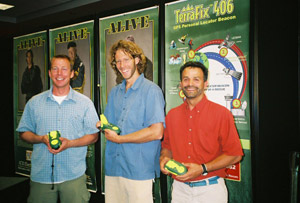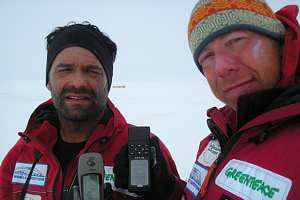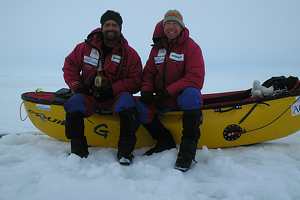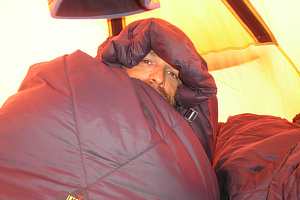August 17, Salt Lake City, UT

Imagine a place where you are surrounded by the latest gear and equipment for as far as the eye can see. And really interesting people, too. Conrad Anker, Ed Viestures and more. This isn't heaven, its Salt Lake City and the Outdoor Retailer - a biannual gear and equipment expo.
Our trip to OR (as it is called among those who are in the know) was sponsored by Granite Gear and ACR Electronics. We used the visit to the nation's premiere outdoor industry event to say thanks to all our sponsors and supporters. More importantly, the show gave us a platform to discuss some of the changes due to global warming we have seen first hand.
The highlight of the event was the Granite Gear ACR cookout on Saturday night. Good food and good friends. The party is easily becoming one of the most coveted venues during the entire week. Will Steger, John Bowermaster, Aron Ralston (pictured with Lonnie and Eric) and even British ocean rower Roz Savage made a brief appearance. We felt very lucky to be in the company of such outdoor 'greats' and have the opportunity to share our story.
What's next you may ask? Stay tuned.
July 14
On Sunday, July 16, Lonnie and Eric are scheduled to arrive at Minneapolis/St. Paul International Airport at 11:45 A.M. Their friends and family are waiting expectantly to embrace the two explorers and to see what toll the expedition has taken on their bodies and minds; how much weight have they lost, how is Lonnie's back, how sunburned are they, are they mentally exhausted. These are all thoughts going through the heads of the welcoming party.
I will be at the airport too, wondering the same things. However, because I have communicated with Eric and Lonnie almost every day of the expedition, it seems, in a sense, as if they were not very far away. Since I jumped on the team just two weeks before departure, I have spent more time interacting with and thinking about Lonnie and Eric while they were away, than I did when they were home.
Communications between Lonnie and Eric, and I have consisted mostly of terse email exchanges and efficient satellite phone conversations. Most of my job has involved coordinating logistics, communicating with sponsors and the media, and updating the web page. Through all of this work I am constantly trying to identify with Lonnie and Eric's perspective on the ice, so I can then coordinate things for them most easily and effectively. It is this thought process that has been most fun and educational for me.
It is one thing to purchase a flight for someone; it is another thing entirely to purchase a flight for two yellow Esquif canoe-sleds. In order to navigate to solutions for this sort of logistical issue, I make persistent phone calls at all hours of the day. I work hard to communicate clearly, thoroughly and honestly so that whomever is on the other end of the line does not get annoyed with the countless details that can be involved with Arctic Ocean logistics.
While I was not able to experience travel on the melting Arctic Ocean, I gained a tremendous appreciation for the commitment required to bring the urgency, scale and impact of global warming to people's attention. While each individual person can do a lot, it is also their job to educate others. Every evening of this exhausting expedition Eric and Lonnie painstakingly wrote their blog entries and recorded their podcasts. Backed by Greenpeace, the One World Expedition has shown the impact of global warming on the Arctic Ocean and the polar bear to millions and millions of people.
Way to go, Lonnie and Eric and Greenpeace. Job well done!
It seems like a long time ago that Lonnie and Eric were battling their way through the towering jumbles of ice rubble just north of Ward Hunt Island, Canada. At this point in the expedition, it was all they could do to advance 3 miles toward the Pole. While Eric and Lonnie clawed their way north, two other expeditions slowly advanced south from the Pole.
These two expeditions had started in Russia, with hopes of crossing the Arctic Ocean to Ward Hunt Island, via the North Pole. They did not know it at the time, but during this past winter less ice had been formed on the Arctic Ocean than ever previously recorded.
Just after Lonnie and Eric received their re-supply drop at N87, the other two expeditions were evacuated. Their progress south had been slowed drastically by rapidly breaking ice floes, in which these two winter expeditions were not equipped to travel effectively. The pilots who serviced these expeditions had never seen the pack ice break up this early.
In the middle of the route between Ward Hunt Island and the North Pole, ocean currents for the most part push east. To the east lies the open ocean, where the pack ice eventually disperses into individual floating pans of ice and icebergs. As the Arctic Ocean breaks up, these eastward currents have a greater effect.
The other two expeditions had been pushed well east of their intended route.
Using their canoe-sleds, Lonnie and Eric successfully puddle-jumped out of the east-pushing currents and on toward the North Pole. As they closed in on the North Pole the number of leads they found increased instead of decreased as they had expected.
On the Arctic Ocean, open water breeds more open water. Ice reflects sun rays. The dark seawater in leads attracts sun rays. Fueled by global warming, these conditions create a vicious, widening warming-spiral that not only leads to more ice melt, but also raises temperatures and increases humidity.
Lonnie and Eric experienced this spiral in a way no other humans ever have. If we do not act now to stop global warming, this spiral will, in less than 50 years, destroy all the ice on the Arctic Ocean and the polar bear along with it.

Lonnie and Eric have been picked up by a helicopter and are on board the icebreaker. They will be in transit back to Minneapolis for the next 8 days. While they are thoroughly enjoying the so many simple comforts that we all take for granted, like showers, furniture, and clean clothes, stay tuned here for information on their progress, news articles, recaps of the expedition and the very latest on global warming.
Lonnie and Eric are scheduled to arrive at Minneapolis/St. Paul International Airport Sunday, July 16 at 11:45 A.M.
Word of the day: "Ursus maritimus": directly translated as sea bear, we call them polar bears. The Norwegian word for a polar bear is more accurate; it is Isbjorn, which directly translates to ice bear. Polar bears live on ice, without ice polar bears die. No ice, no ice bears, it's that simple.
July 6, 89 56.24'N: 104 56.03W

Day 67. The wind picked up considerably last night, or at least, what we call the night. The gusts also brought the biggest rain storm we've had to date. We hesitate to say it 'poured' but a steady drizzle lasted well into the morning. The hard wind-packed snow of yesterday turned to mush, slush and any other 'ush' word you might want to make up.
We traveled toward the North Pole in order to find a suitable ice pan to support a helicopter. It wasn't easy. The ice we have been traveling on the past week is relatively thin - 3 feet or so. We needed something over six feet thick. We skied through slush and large meltwater pools that were as deep as our shins. More water skiing. Eventually, we found an old pan, set up the tent and called in to confirm our position.
We took a little extra time to sort and inventory gear. All of our equipment seems to have survived the journey with little damage. Most noticeable are the sled-canoes. These boats have carried our supplies, and us at times, for nearly 700 miles of the most severe conditions imaginable. Despite this they look brand new!
This is our last camp. We ate our last meal of noodles and crawled in the tent for one last sleep. However, we are hesitant to fully close our eyes just yet. Instead, we unzip the tent door and steal one last glance after another at the scene beyond.
Let's be honest here: We are looking forward to enjoying some of even the simplest modern conveniences, seeing friends and family and maybe a glass of orange juice, but not just yet.
It has been hard to get to know this place. It definitely doesn't happen all at once. A piece here, an experience there. An insight gained. Hours that turn into days and days that add into months. It is so easy to think that all this emptiness is just ice, snow and water. It's not.
We wish we had the space and time to list all the things we have learned - about ourselves, teamwork, perseverance, and most importantly, the current state of the Arctic Ocean's sea ice.
What should we do we do with all the knowledge we've gleaned from this journey? We are only now beginning to imagine the effect of this expedition on our future.
One thing's for sure, we'll appreciate tables a lot more. And solid ground. Trees, definitely trees. The relationships of friends and family who have supported us for so long. Clean underwear will be nice. So will summer - a Minnesota summer.
Those are, of course, all the tangible things that affect our immediate future. More uncertain are months from now when these experiences have gained the benefit of distance and time. What kind of people will we be then? Will we be different? Probably not much. But we won't be the same, either.
We are glad for this experience. It has reinforced our love of wild spaces and our desire to help protect them. Our resolve to stop global warming has only been strengthened.
We are also pleased that you have taken this perilous expedition with us. By connecting to the internet, reading these blogs, you too have begun the first steps of a great adventure. You have learned about the Arctic Ocean, seen its moods and subtleties, learned about global warming and, hopefully, added one of 200,000 signatures to a petition to get the polar bear listed as an endangered species.
From here, let us continue together. This journey is really only beginning. Global warming is something that affects us all.
We will not be able to update the web site for the next 6 or 7 days while we travel through Russia - no satellite phones allowed. In our stead the multi-faceted, multi-lingual, multiplication whiz, John Huston, will keep you posted. More news, global warming info, more expedition gear, more highlights, future speaking engagements and perhaps some juicy tidbits about Huston, the man behind the myth.
Don't worry. We'll be writing more and more as soon as possible. There is lots of work to be done in the fight to stop global warming and help save the polar bear. We are rolling up our sleeves.
Word of the day: endeavor - to stop global warming.
July 5, 89 59.17'N: 108 56.03W

Day 66. From Lonnie: On May 1, 2006, Eric and I embarked on an unprecedented journey to the North Pole. To get here, we pulled and paddled specially modified canoes across 700 miles of shifting sea ice and open water of the arctic ocean. Our objectives were to complete the first-ever summer expedition to the North Pole to help save the polar bear by bringing attention to the growing issues surrounding global warming. On July 1, 2006 after 62 grueling days, the we attained the North Pole.
After sustaining a serious strain to my back early in the expedition and after evaluating the rapidly deteriorating and dangerous ice conditions, I decided to not attempt the increasingly hazardous journey back to Greenland from the North Pole.
Further travel would put us in a life-threatening situation with little chance of rescue. The ice pans on which we travel are fractured into a maze of open water which extends from land to the Pole. These ice conditions are very susceptible to fast-moving ocean currents, which push east toward the open ocean. The planned route to land is breaking up unusually early.
As the expedition leader it is my responsibility to weigh all of the options, including the safest possible evacuation if it is deemed necessary. In order to avoid a search and rescue operation that would put persons at unnecessary risk, I have been researching vessels already in the area so in the event of an evacuation, we could leave on a vessel in close proximity. A Russian icebreaker (with a helicopter) is on a scheduled excursion to the North Pole and will be enlisted for a routine pick up.
While reaching the North Pole has been a major truimph and unprecedented first, this expedition has always been more about exposing the dangers of global warming and the plight of the polar bear than our physical journey. We will continue our quest to stop global warming and save the polar bear long into the future.
July 4, 89 57.14'N: 144 09.45W

Day 65. We no longer have to melt snow for drinking and cooking. We simply camp next to a meltwater pool and fill all our nalgene bottles and cook pots with all the fresh water we want. This of course saves greatly on our fuel.
Lonnie decided to have his second bath in 64 days. A ground pad to stand on and two quart thermoses filled with warm water is hardly the full spa treatment but, given the circumstances, more than sufficient. Lonnie was waiting for the wind to die down a bit, but it never did. The trick is to stop the shower just before hypothermia sets in.
Eric opted for slightly less drastic personal grooming measures. He put on a clean pair of underwear.
We spent a lot of time talking about the Fourth of July, parades, fireworks and that segued into some of the things we miss about home.
Luckily, John Huston forwarded us several emails from well wishers back home and around the globe. It is nice to know there is so much support for our endeavor and for protecting the polar bear.
The U.S. Government will decide on endangered species act protection by year's end. The settlement of a recent lawsuit requires the U.S. Fish and Wildlife Service to complete its "12-month" finding on whether polar bears should be listed under the Endangered Species Act by Dec. 27, 2006.
Today's picture: Lonnie warming up after his shower.
Word of the day: epicurean - Do Clif bars count in this definition? Then that's us.
